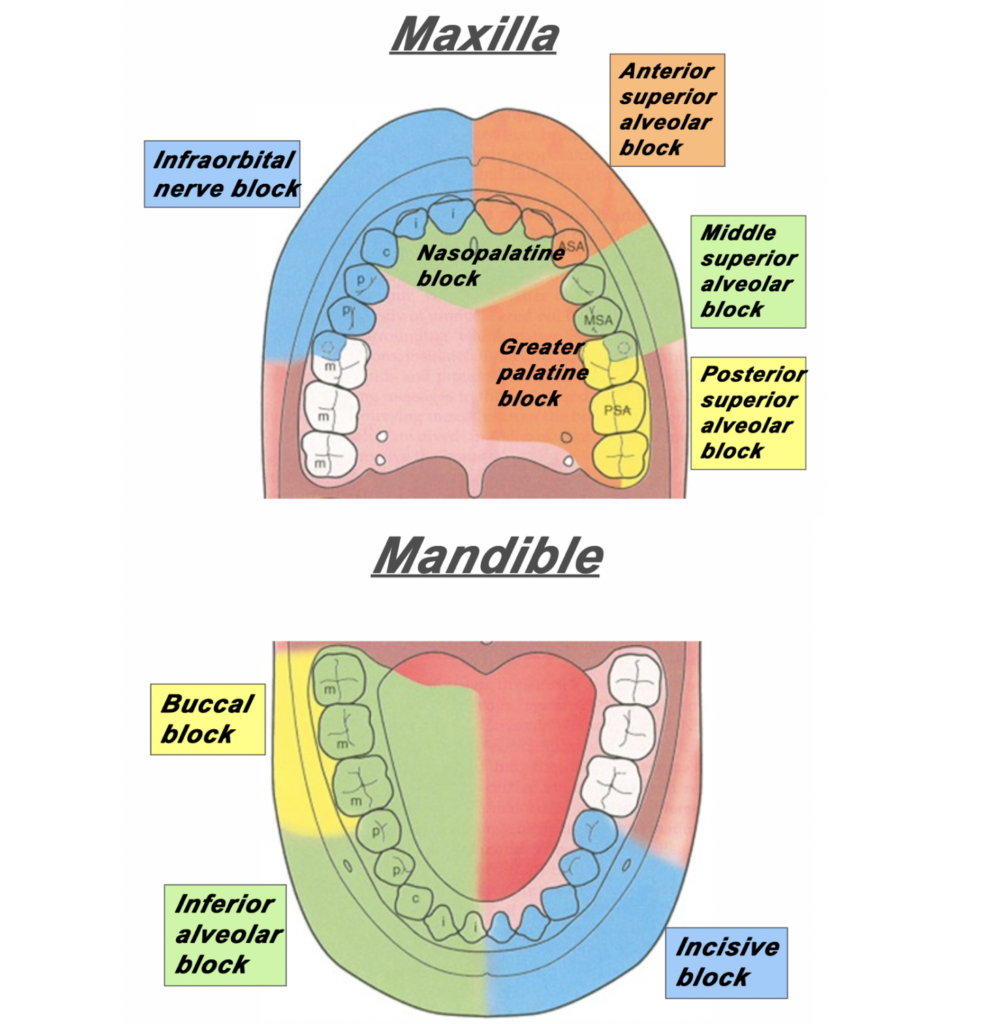For many patients, getting numb is the scariest part of going to the dentist. My patients often ask me how long they will be numb after their appointment. The answer to this question, as with most things in life, is that it depends. There are many factors such as the type of anesthetic used, the anesthetic technique used to deliver the anesthesia, and the doctor who placed the anesthetic. That said, there are a few general rules of thumb that apply in most cases. If your numbness doesn’t go away after six hours you should reach out to your dentist and let them know.
Where Are You Numb?
The type of procedure you had done will largely dictate how long you will be numb. If you had something done to an upper tooth, then you can generally expect to be numb for 2-3 hours. If you had something done on a lower tooth, then you can likely expect to be numb for 3-5 hours. This is a very general rule-of-thumb, but it works in most cases.

Many dentists only numb one or two teeth at a time when treating upper teeth. If you had one filling on an upper tooth, then your dentist likely numbed the area immediately surrounding that tooth. You may feel this numbness on the inside of your cheek, next to the area where the dentist numbed you. As you can see from the diagram above, anesthesia in the maxilla (upper jaw) only numbs a few teeth at a time.
When it comes to bottom teeth, most dentists block one entire side of the jaw no matter how many teeth they treat. In the diagram above, this would include the green and yellow areas of the lower jaw. This is true whether you have one cavity, or multiple extractions on the same side. Your tongue, lower lip, and inner cheek may all be numb on the side the anesthesia was placed.
There are several types of block that may be performed on the lower jaw. All of these blocks will numb different amounts of the jaw and surrounding tissues. But, in most cases they will wear off after three to five hours.
Why Does My Heart Race After Numbing?
The anesthetic used in dental anesthesia commonly contains epinephrine (a.k.a. adrenaline). This is the fight-or-flight hormone that makes your heart pound when you experience a dangerous situation. If the epinephrine from a dental injection enters your bloodstream, it will briefly cause an increased heart rate. You may also feel a sense of panic, chills, and your limbs may shake. Stay calm, these symptoms will pass within only a few minutes. Although it can be frightening, getting a case of “the shakes” is harmless and typically subsides rapidly.
My Numbness Won’t Go Away
If it has been more than six hours since you had dental anesthesia and you are still experiencing numbness, let your dentist know. This is especially true if you had a wisdom tooth removed or an implant placed. In some rare cases, tooth extraction or implant placement may result in nerve damage. The earlier treatment begins to correct the damage, the better the prognosis.
I Feel Tingling Where I Was Numb
If you experience tingling, burning, or the sensation of “ants crawling” on your face after dental anesthesia that persists for more than an hour after the numbing has worn off, notify your dentist. This could be a sign of possible nerve damage, and the earlier it is treated, the better the outcome is likely to be.
I Can’t Blink or Smile
If you are unable to close one eye or smile where you are numb, then you are likely experiencing a transient facial nerve palsy. Though this can be frightening, it may be comforting to know that it will likely go away, and that you will regain normal function of your facial muscles after the anesthesia wears off. It may be a few hours before you can close your eyes, so it is advisable to wear an eye-patch to keep your eye closed and prevent it from becoming too dry. If you experience a facial nerve palsy, you should notify your dentist.

